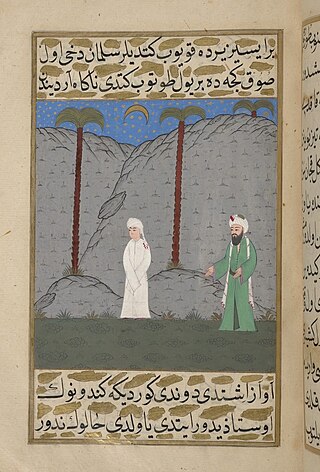Saʽid, also spelled Saʽeid, Said, Saïd, Sid, Saeed, Saed, Saied, Sayeed or Sayid, is a male Arabic given name which means "blessed, good luck, joy" or "happy, patient". The name stems from the Arabic verb sa‘ada.

Salman al-Farisi was a Persian religious scholar and one of the companions of Muhammad. As a practicing Zoroastrian, he dedicated much of his early life to studying to become a magus, though he later became preoccupied with travelling throughout Western Asia to engage in interfaith dialogue with other religious groups. His quests eventually prompted his conversion to Christianity and later his conversion to Islam, which occurred after he met and befriended Muhammad in the city of Yathrib. He was a prominent non-Arab companion and one of Muhammad's closest friends; Muhammad had once stated to a gathering of his followers that he regarded Salman as a part of his family. In meetings with the other companions, he was often referred to by the kunyaAbu ʿAbdullah.
Rabia or Rabiah is the transliteration of two Arabic names written differently in Arabic text however they may be written similarly in the Latin script:
Shah is a common surname in India, Nepal, Bangladesh and Pakistan.
Ahad is a Middle Eastern given forename primarily used by Muslims and Jews. It is also used as a family name (surname).
Yusuf is a male name meaning "God increases". It is the Arabic equivalent of the Hebrew name Yosef and the English name Joseph. It is widely used in many parts of the world by Arabs of all Abrahamic religions, including Middle Eastern Jews, Arab Christians, and Muslims.
Salman or Salmaan or sal-mahn, also spelt Sulman, is an Arabic male given name meaning "Safe" or "Secure".
Al-Farisi is a surname. Notable people with the surname include:
Kayvan is a Persian masculine given name denoting the planet Saturn. It is related to the word for Saturn in several old languages, including Kaimanu in Sumerian, Kajamānu in Akkadian, Kewwān in Syriac, and "Kewan" (kywʾn') in Middle Persian. That a 16th-century high priest of Stakhr was named Azar Kayvan suggests that "Kayvan" was used as a name for a person in Iran as early as that time, particularly among followers of Zoroastrianism. To date "Kayvan" is a popular name among families following Zoroastrianism. Kayvan is distinct from the similar Persian word Kayhan, meaning "universe", also used as a masculine given name. To English speakers, the spelling Kayvon is closest to the Persian pronunciation,.
Yakub or Yaqub is a male given name. It is the Arabic version of Jacob and James. The Arabic form Ya'qūb/Ya'kūb may be direct from the Hebrew or indirectly through Syriac. The name was in use in pre-Islamic Arabia and is a common given name in Arab, Turkish, and Muslim societies. It is also used as a surname. It is common in Polish, Czech and Slovak languages, where it is transliterated as Jakub.
Taqi or Taghi is a male Arabic given name and surname. It may refer to:
Turki is a given name and surname, for more etymology, see Turki (disambiguation).
Al-Harthi is an Arabic surname. Notable people with the surname include:
Al-Habsi is an Omani surname. Notable people with the surname include:
Baran is a given femenine name(pronounced bu-run). It is most commonly used as a feminine name in Farsi. Baran means rain.
Al-Zahrani, al-Zahrani or Alzahrani is a surname in Saudi Arabia belonging to the royal Zahran tribe.
al-Karbalaei is an Arabic surname that it is used to indicate the person originates from Karbala, Iraq. Notable people with the surname include:
Seidu is an African and southwestern Asian name that is heard around Ghana, Nigeria, Ethiopia, Oman, Qatar and more.
Isma'ilism is a branch or sub-sect of Shia Islam. The Ismailis get their name from their acceptance of Imam Ismaʻil ibn Jafar.
Al-Amri is an Arabic language surname. Notable people with the surname include:
This page is based on this
Wikipedia article Text is available under the
CC BY-SA 4.0 license; additional terms may apply.
Images, videos and audio are available under their respective licenses.
